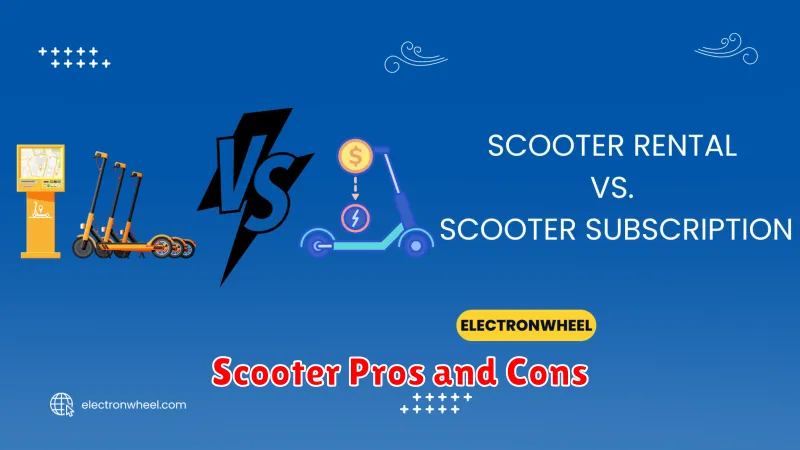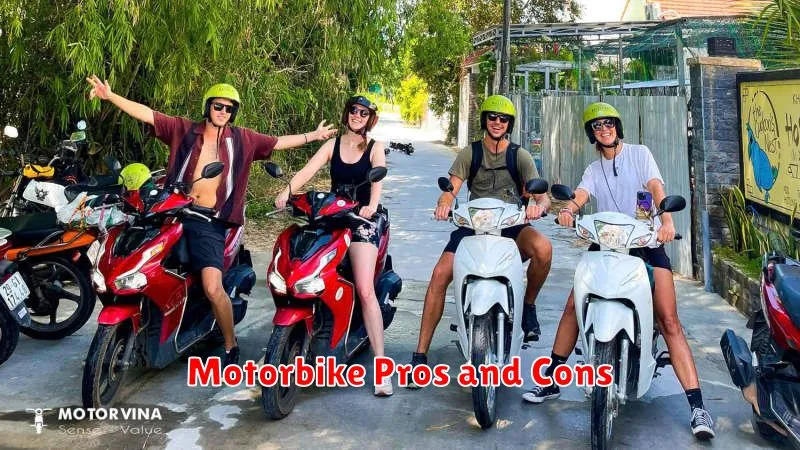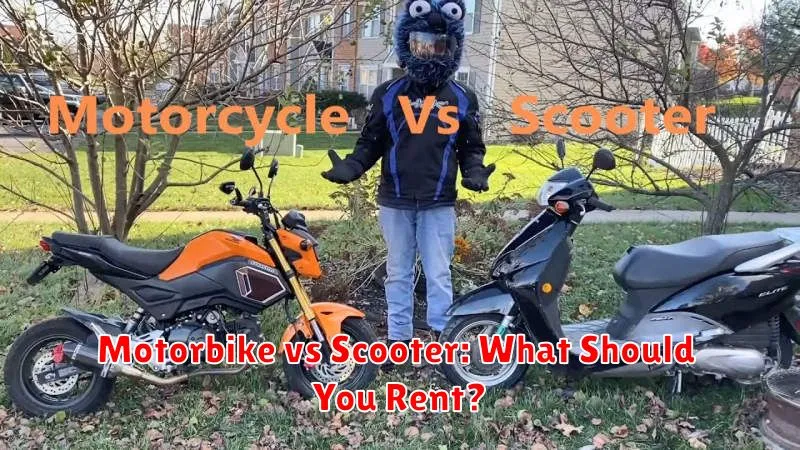Choosing between a motorbike and a scooter for your next rental can be a tough decision. Factors like your destination’s terrain, your experience level, and your budget all play a significant role. This article will provide a comprehensive comparison of motorbikes and scooters, helping you make an informed choice for your specific needs. We’ll explore the advantages and disadvantages of each, considering aspects like ease of use, cost, practicality, and overall riding experience, so you can confidently determine whether a motorbike rental or scooter rental is the best fit for your upcoming trip.
Are you searching for a thrilling adventure or a convenient way to navigate city streets? Understanding the key differences between motorbikes and scooters is crucial for selecting the optimal rental. This article will delve into the nuances of each option, from engine size and power to storage capacity and fuel efficiency. Whether you’re a seasoned rider considering a powerful motorbike rental or a first-timer contemplating the ease of a scooter rental, we’ll equip you with the knowledge to make the right decision. By weighing the pros and cons, you can confidently choose the perfect two-wheeled companion for your journey.
Differences Between Motorbike and Scooter
While both offer convenient personal transportation, several key distinctions set motorcycles and scooters apart. One of the most obvious differences lies in their construction. Motorcycles typically feature a larger, more robust frame and engine, contributing to their higher speeds and greater power.
Scooters, conversely, are generally smaller and lighter, with a step-through frame design. This makes them easier to mount and dismount, particularly for riders of shorter stature. The engine on a scooter is typically smaller and less powerful, making them better suited for city riding and shorter distances.
Another key difference lies in the transmission. Motorcycles almost universally utilize manual transmissions, requiring the rider to shift gears. Scooters, in contrast, usually feature automatic transmissions, simplifying operation and making them easier to learn for new riders.
Wheel size also distinguishes the two. Motorcycles generally have larger wheels, providing better stability at higher speeds and on uneven surfaces. Scooters often have smaller wheels, contributing to their lighter weight and greater maneuverability in tight spaces.
Which One Suits Your Travel Needs?
Choosing between a motorbike and a scooter depends heavily on your individual travel requirements. Consider the following factors to make the best decision:
Distance and Terrain
For longer journeys and challenging terrain, a motorbike generally offers more power, stability, and comfort. Scooters are better suited for shorter distances, particularly in urban environments or on relatively smooth, paved roads. Think about where you’ll be traveling and the types of roads you expect to encounter.
Luggage Capacity
Motorbikes typically provide more storage space for luggage, making them a more practical choice if you’re carrying a significant amount of gear. Scooters often have limited under-seat storage and may require additional accessories for carrying larger items.
Experience Level
Scooters are often considered more beginner-friendly due to their automatic transmissions and lighter weight. Motorbikes, particularly those with manual transmissions, may require more experience and skill to handle safely.
Scooter Pros and Cons

Scooters offer several advantages, especially for navigating urban environments. They are lightweight and easy to maneuver, making them ideal for weaving through traffic. Their smaller size also simplifies parking. Fuel efficiency is another strong point, allowing you to cover more ground on a smaller budget. Generally, rentals are cheaper than motorbikes.
However, scooters have drawbacks. Limited storage can be a concern, especially for longer trips or carrying multiple passengers. Weather protection is minimal, making them less appealing in rain or cold. Scooters are also less stable at higher speeds and offer less protection in the event of an accident. Engine power is generally lower, impacting hill-climbing ability and highway performance.
Scooter Pros Summary
- Easy to maneuver
- Lightweight and easy to park
- Fuel-efficient
- Generally cheaper to rent
Scooter Cons Summary
- Limited storage space
- Minimal weather protection
- Less stable at higher speeds
- Less protection in accidents
- Lower engine power
Motorbike Pros and Cons

Motorbikes offer a unique blend of advantages and disadvantages, especially when considering them as rentals. Understanding these can help you decide if a motorbike is the right choice for your needs.
Pros
-
Thrilling Riding Experience: Motorbikes offer a sense of freedom and excitement that other vehicles can’t match.
-
Maneuverability: Their smaller size makes navigating congested streets and tight parking spaces easier.
-
Fuel Efficiency: Generally, motorbikes consume less fuel than cars, leading to cost savings.
Cons
-
Safety Concerns: Motorbikes offer less protection than cars in accidents.
-
Exposure to Elements: Riders are directly exposed to weather conditions like rain, wind, and sun.
-
Limited Storage: Carrying luggage or other items can be challenging on a motorbike.
-
Requires More Skill: Operating a motorbike requires a higher level of skill and experience than a scooter.
Fuel Efficiency Comparison
Fuel efficiency is a key factor to consider when choosing between a motorbike and a scooter, especially if you’re renting for a longer duration. Generally, scooters are more fuel-efficient than motorbikes.
Scooters, with their smaller engines and lighter frames, are designed for urban commuting and prioritize fuel economy. They typically achieve higher miles per gallon (MPG) compared to motorbikes, especially within city limits.
Motorbikes, while offering more power and speed, often consume more fuel due to their larger engine displacement. However, fuel efficiency can vary greatly depending on the specific motorbike model and riding style.
For example, a 125cc scooter might average 80-100 MPG, while a 250cc motorbike might achieve 50-70 MPG. These are just estimates, and actual fuel consumption depends on factors such as terrain, speed, and rider weight.
Ease of Use and Comfort
Ease of use and comfort are key considerations when choosing between a motorbike and a scooter for your rental. Scooters generally offer a more user-friendly experience, particularly for beginners. Their automatic transmissions eliminate the need for clutching and shifting, simplifying operation. Motorbikes, while requiring more skill, offer a greater sense of control and engagement for experienced riders.
In terms of comfort, both options have their pros and cons. Scooters typically provide a more upright and relaxed riding position, and a step-through frame makes mounting and dismounting easier. They often feature built-in storage, convenient for carrying belongings. Motorbikes, however, tend to offer better long-distance comfort and stability, particularly on uneven terrain. Their larger wheels and more robust suspension systems absorb bumps and vibrations more effectively.
Ultimately, the best choice depends on your individual riding experience and intended use. For short trips around town, a scooter’s ease of use and convenience may be ideal. For longer journeys or more challenging terrain, a motorbike’s stability and performance might be preferable. Consider your priorities carefully to make the most informed decision.
Best for City vs Countryside
When deciding between a motorbike and a scooter for your rental, consider where you’ll be riding. For city riding, scooters offer distinct advantages. Their smaller size allows for easier navigation through congested streets and superior parking maneuverability. Scooters are generally more fuel-efficient, an important factor given stop-and-go city traffic. Their automatic transmissions also simplify riding in urban environments.
Motorbikes, however, become a more appealing option for countryside exploration. Their larger engines provide the power and stability necessary for longer distances and higher speeds commonly encountered on open roads. Motorbikes generally offer more comfortable seating for extended rides. While scooters can handle some countryside riding, motorbikes excel when navigating diverse terrain and challenging road conditions.

